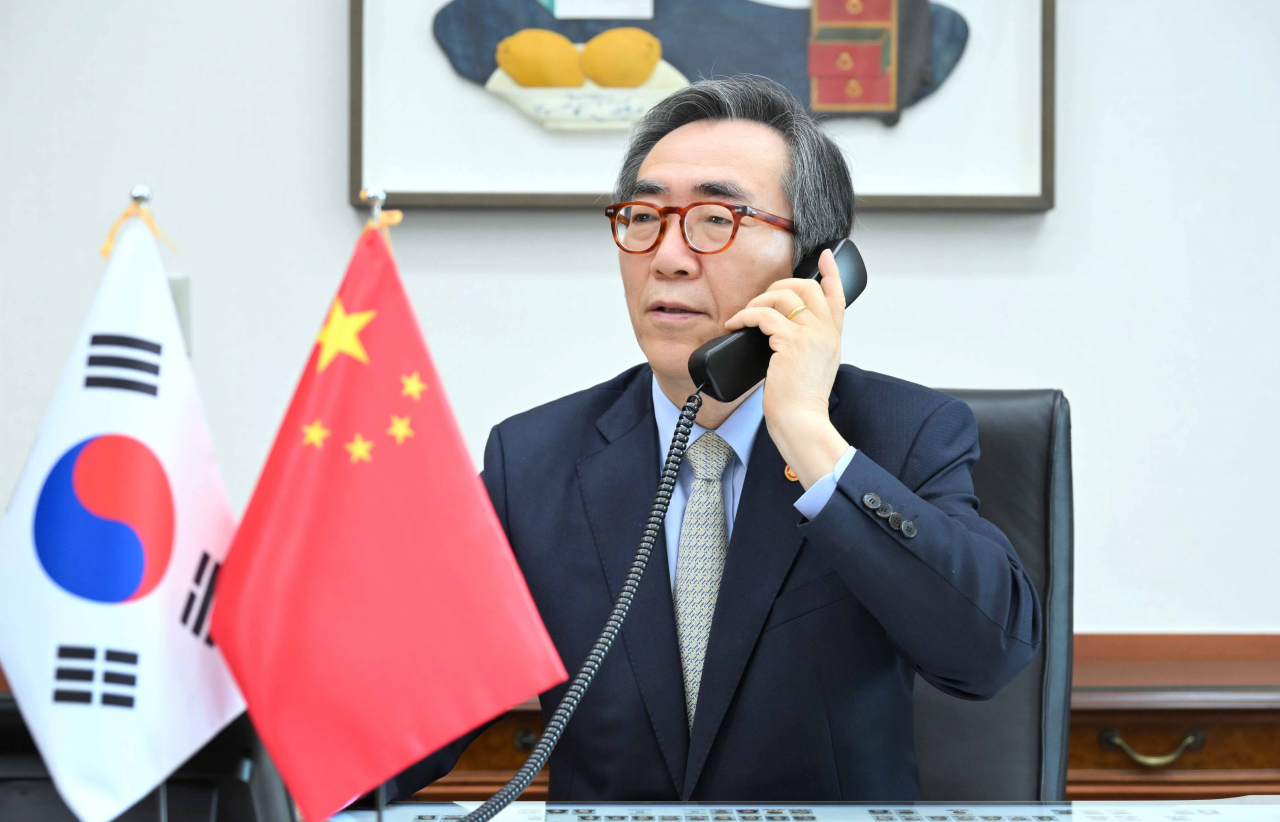China invites S. Korean top diplomat, calls for ‘positive, objective’ policy
FM Cho calls for China not to forcibly repatriate NK defectors against their will
By Ji Da-gyumPublished : Feb. 7, 2024 - 14:04

South Korea's newly appointed Foreign Minister Cho Tae-yul received an invitation to visit China from his Chinese counterpart, Wang Yi, during their first phone call Tuesday, according to Seoul. Beijing concurrently revealed that Wang expressed expectations for South Korea to adopt a "positive, objective and friendly policy" toward China.
Cho and Wang engaged in a 50-minute phone conversation, discussing matters of mutual interest, including high-level exchanges, supply chain cooperation and other broader aspects of bilateral relations between South Korea and China, South Korea's Ministry of Foreign Affairs said Tuesday.
The talks also covered issues related to North Korea, including its nuclear buildup, its military cooperation with Russia and China's forced repatriation of North Korean defectors.
"Minister Wang has extended an invitation to Minister Cho to visit China, expressing his desire to foster close cooperation for the advancement of bilateral relations by establishing a strong working relationship," the Foreign Ministry said in a statement.
"Minister Cho expressed gratitude for Minister Wang's congratulations on his inauguration and the invitation to visit China as well as proposed discussing his potential visit at a mutually convenient time through diplomatic channels."
Cho proposed advancing follow-up consultations following the agreement reached at the foreign ministerial meeting in November to expedite preparations for a trilateral summit involving South Korea, Japan and China. However, Wang solely expressed support for the efforts of South Korea, which hosted the November meeting, according to Seoul.
During their phone call, Cho also expressed concerns regarding North Korea's ongoing military cooperation with Russia and called for China to "enhance its constructive role" in urging North Korea to cease further provocations and move toward the path of denuclearization.
Additionally, Cho raised the issue of China's forced repatriation of North Korean defectors, conveying both domestic and international concerns.
Cho "appealed for the Chinese government's special cooperation to ensure that North Korean defectors can remain where they choose without facing forced repatriation to North Korea," according to the Foreign Ministry.
On the economic front, Cho and Wang emphasized the importance of cooperation in managing a stable supply chain amid an evolving trade environment. They agreed to deepen trade and investment between the two countries to seek new drivers of development.
"Both sides reaffirmed their shared commitment to valuing and further developing the Korea-China relationship. They concurred that enhancing strategic exchanges and communication at various levels is crucial for the future-oriented development of bilateral relations," the Foreign Ministry in Seoul said.
"In this regard, Minister Cho emphasized the importance of minimizing sources of conflict between Korea and China and pursuing sustainable qualitative growth based on trust, building upon achievements of cooperation."
During the phone call, Wang expressed hope that South Korea would pursue a "positive, objective, and friendly policy towards China and adhere to the one-China principle," the Chinese Foreign Ministry said Tuesday.
Wang also underscored China's expectation for South Korea to "maintain the political foundation for China-South Korea relations and promote bilateral ties to return to the track of sound and stable development."
The Chinese foreign minister went on to say that economic ties between China and South Korea are deeply interconnected, with tightly woven industrial and supply chains.
Wang urged Seoul and Beijing to collaborate in preserving the stability and seamless operation of the industrial and supply chains and "resist the politicization, pan-securitization and instrumentalization of economic issues," or viewing economic issues primarily through a security lens.
Wang told Cho, "A near neighbor is better than a distant cousin," quoting an old Chinese saying, according to China's Foreign Ministry.



















![[Today’s K-pop] Treasure to publish magazine for debut anniversary](http://res.heraldm.com/phpwas/restmb_idxmake.php?idx=642&simg=/content/image/2024/07/26/20240726050551_0.jpg&u=)